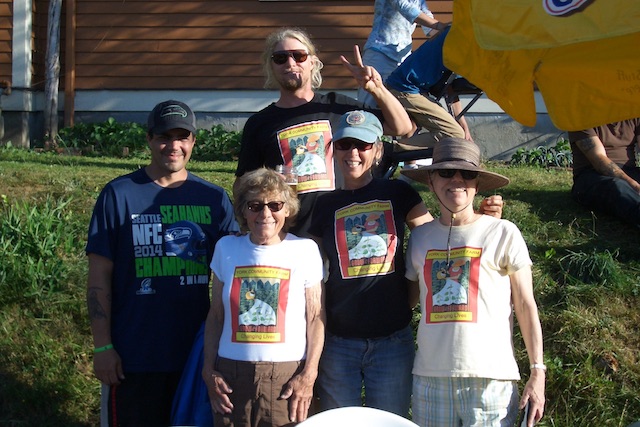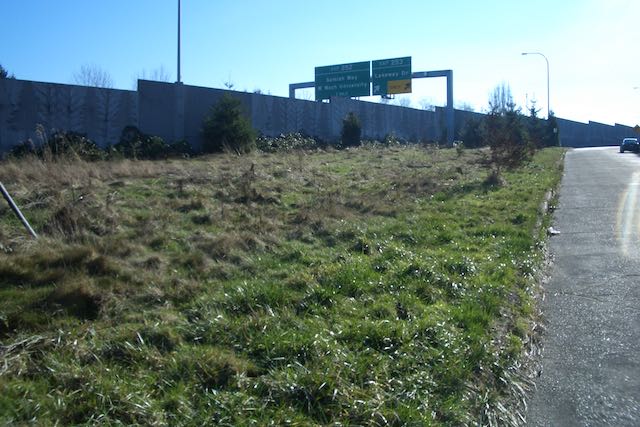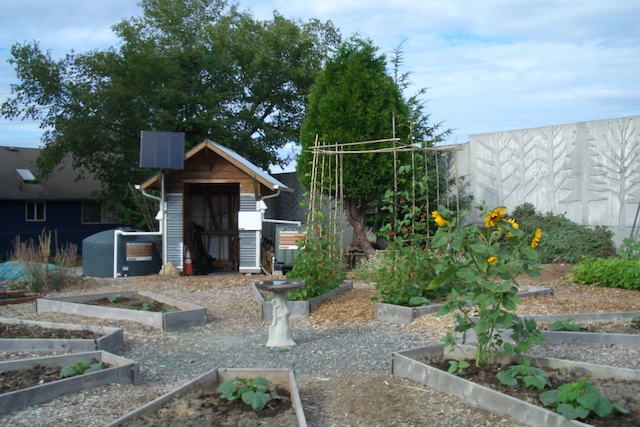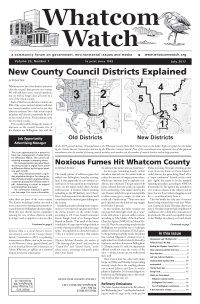by Kathryn Fentress
 York Farm Staff. photo: photo: Bob Pescovitz
York Farm Staff. photo: photo: Bob Pescovitz
Mary Loquvam was raised in Oakland and later moved to Los Angeles. The majority of her career was spent working with habitat and other environmental issues. She was director of the Los Angeles Audubon Society when she retired. Her parents are from Washington state and she and her husband moved to Bellingham in 2005 to the York neighborhood. Along with her volunteer work, she enjoys traveling, museums, and late night political satire.
Kathryn Fentress: How did the York Farm get started?
Mary Loquvam: In 2012 we started with a very small garden in a backyard of a pottery studio across the street from City Gate, a residential facility with 32 units for people coming out of prison and trying to reintegrate into society. The original vision was to offer a gardening experience to some of these re-entry folks.
 Land before it became York Farm. photo: Mary Loquvam
Land before it became York Farm. photo: Mary Loquvam
In 2013 we moved to the DOT property along the freeway in the York neighborhood. The piece is ¾ of an acre and we started the first year with 32 fruit trees and eight beds. Now we are up to 3,300 square feet under cultivation and 50 trees in the orchard. When we started, I knew that we would not get done what I envisioned with volunteers. I wanted some kind of program to pay for people to come in and work and wanted to hire people who are marginally employable and underserved, like the homeless, veterans and people coming out of prison. I wrote some grants to get the money to pay them and to give them resume-building experience. We are currently going into our fifth growing season. We have given out stipends of $1500 per intern, per season, and we have so far given out close to $30,000.
The $1500 is for their labor. What about the other expenses?
I have had to write other grants for supplies and seeds and so forth. I wanted to have a farm with a single fall harvest because I knew I wouldn’t be able to secure the funds to pay interns for more than every other day. We are working three half-days a week, or about nine hours a week. We are growing dry beans, winter squash and potatoes. We harvest these in September. We also have a number of beds with cucumbers, tomatoes, chard, etc., so that the interns can take home fresh food every day during the summer.
Who are the interns?
Several people have come to us from the Opportunity Council and Lydia Place and a number from City Gate, which is an invaluable resource for us. We have also had a number of Western students get involved as volunteers. This cadre actually helped get the first beds in. The intersection of these students and those we generally recruit has been very rich. The students bring focus, enthusiasm, and direction and they get to work side by side with people who have had very different life experiences. I think it has been a great community-building process.
We just started working with a new group: Service Learning students from Western who, luckily, bring their own funding. Again we have this intersection of students working with re-entry folks. This is the first year for this program, which began in April and will end in June for the summer break.
Do some folks get attached and want to stay on?
I have to limit an intern to three seasons because they need to move on to other things, but there is crying need for some to return. I have had representatives from the Department of Vocational Rehabilitation and the Department of Corrections come by in the past two weeks. The Department of Corrections people say they have lots of people they can send over. The Vocational Rehabilitation Department can offer case management and develop an IEP, an Individualized Employment Plan for the interns. With the case management piece, I could alert someone if I see an intern having a lot of emotional problems on site and tell them that the person needs additional support. I am seeing that this component provides backup for the project and opens the way for additional funding. We can link these components and then go to the government and demonstrate that we are offering paid employment experience. This kind of linkage is starting to happen. This past week I had a visit from a city council member who is interested in keeping people out of jail. He seemed impressed and, hopefully, he can be an advocate for us with the City Council.
 The Farm Center photo: Mary Loquvam
The Farm Center photo: Mary Loquvam
What do you see as the next step in development?
One of the things we need is to become financially sustainable and grant funding is not sufficient. So we are looking forward to some new possibilities of where we can go. Currently we are off the grid and capturing rain water. All the water we collect during the winter is just sitting there, so I would like to set up a greenhouse where we could have aquaponics and keep something going all year long. Aquaponics could potentially develop into a new industry in Whatcom County that could hire re-entry people. The Northwest Chapter of Engineers Without Borders recently contacted me. Most of their projects are usually in foreign countries in Africa and Asia and those projects are very difficult to mount. They are looking at more regional and local projects and they seem interested in helping this project scale up. The big picture vision is creating industry in Whatcom County and jobs for employment.
How many interns are you able to support per season?
Usually three to nine from April to the end of October. We don’t have that much work. The most I can have now is four, but we are ready to move into a larger space. We have been talking to the city about finding a site with them. Bellingham has a large number of unemployed. The City Council is interested in revitalizing the Heritage Maritime Park, but we need two acres and that spot isn’t big enough.
This project has continued to grow over the years. What inspired you to begin the first garden?
When we lived in California, I shopped for years at Trader Joe’s. When we settled in Bellingham, I noticed that the apples were very expensive, more than a dollar per apple. This is crazy — in the fall the apples are rolling down the street. My initial plan was to plant lots of fruit trees in the neighborhood. I got a lot of blowback on this Johnny Appleseed idea. Then an elder neighbor told me to start a garden. I didn’t really want to start a garden; I wanted to start an orchard but decided, “OK.”
So it all started because of the exorbitant price of apples.
Yes, and we have now turned a community eyesore into a community asset.
How wonderful that one idea can evolve into such a beautiful project and one that is continuing to expand! What ways could folks who are interested help out?
Come to our celebrations and work parties. Every year we have a solstice celebration/fund raiser in the cul-de-sac near the Farm, this year on June 24th. We host a barbecue with live music. I make chili and Kulshan provides beer. The party is usually 11 a.m. to 3 p.m. or noon to 5 p.m. This year we will have a yard sale as well. In the fall we have an apple-pressing day. People can bring their apples, early morning to evening. We usually give away some food and have fun. Visitors to the Farm are welcome. We are working there Monday and Wednesday from 3:30 to 6:30 and Friday mornings. Donations are always appreciated. If folks have garden tools they wish to donate, they can contact me at mary@pesco.net.
Thank you Mary for your expanded vision that brings together so many environmental and social concerns for our community. We hope a larger space opens up for the Farm in the near future.
_________________________________________
Developing Aquaponics as a Local Industry
The Northwest Washington Chapter of Engineers Without Borders
has been in contract with Mary Loquvam about developing aquaponics
as a local industry. The simplest definition of aquaponics is
the combination of aquaculture (raising fish) and hydroponics (the
soil-less growing of plants) that grows fish and plants together in
one integrated system. The fish waste provides an organic food
source for the plants, and the plants naturally filter the water for
the fish. https://www.theaquaponicsource.com/what-is-aquaponics/
_________________________________________
Kathryn Fentress and her husband moved to Bellingham 20 years ago for the water, trees, fresh air and mountains. She is a psychologist in private practice and believes that spirit is in everything. Living in harmony with nature reflects a reverence for life. She delights in finding and meeting those people whose stories so inspire all of us.




























